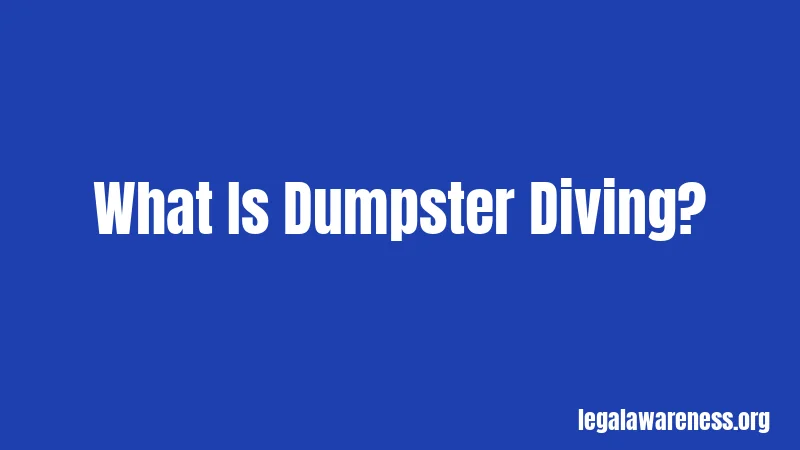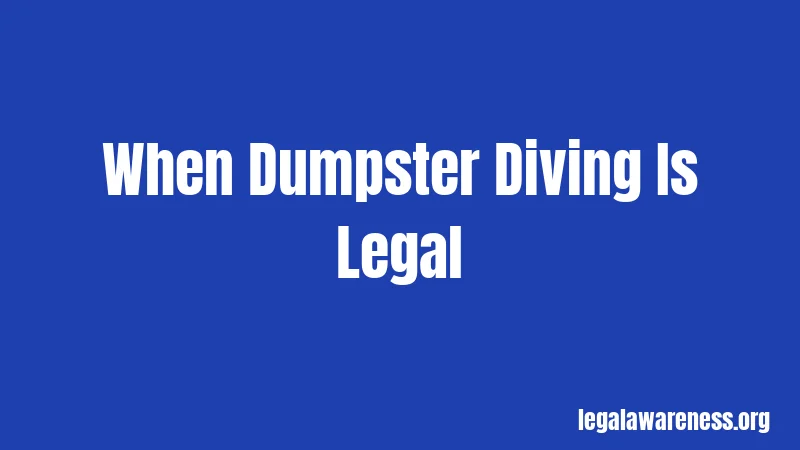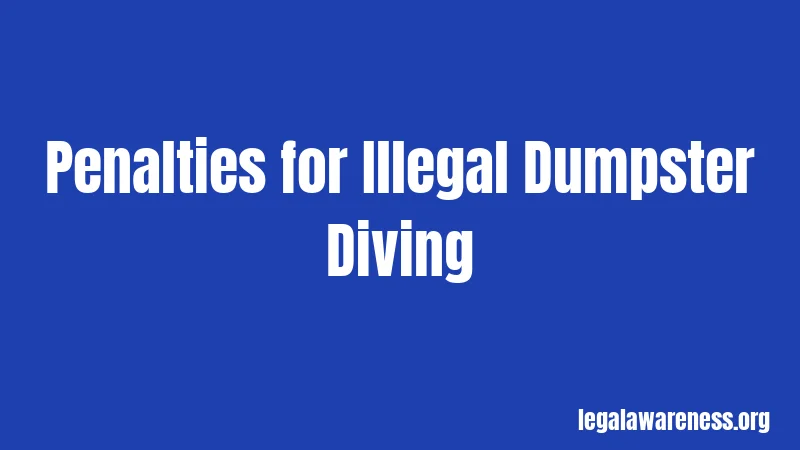Dumpster Diving Laws in California (2026): The Truth May Surprise You
Most people think dumpster diving is totally illegal. They’re wrong. The truth is more complicated than you’d think, and honestly, it might surprise you.
In California, dumpster diving exists in a gray area. The state doesn’t ban it outright. But you can still get arrested. You can still face fines. You can even end up with a criminal record if you’re not careful.
Let’s break down exactly what you need to know to stay legal.
What Is Dumpster Diving?

Dumpster diving is the practice of searching through trash for usable items. People do it for different reasons. Some want to save money. Others care about reducing waste. A few are looking for treasures to resell.
Sounds simple, right? It’s actually not.
The activity involves going through dumpsters, trash cans, or recycling bins. You’re looking for food, clothes, electronics, furniture, or anything else someone threw away. In theory, it’s about reclaiming items that would otherwise end up in landfills.
But here’s where it gets tricky. Not all dumpster diving is legal.
California’s Basic Legal Framework
California doesn’t have a specific law that says “dumpster diving is illegal.” That’s the good news. The bad news? Other laws can make it illegal depending on where and how you do it.
The most important case to know about is California v. Greenwood from 1988. The U.S. Supreme Court ruled that once you put your trash on the curb for collection, you have no privacy rights to it. Anyone can legally search through it.
This means curbside trash is fair game. Basically.
But this doesn’t give you permission to dive everywhere. That’s where people get into trouble.
When Dumpster Diving Is Legal

Wondering if you can legally dumpster dive? Here’s what actually matters.
Public property is usually okay. If a dumpster sits on public land and isn’t locked or fenced off, you’re probably fine. Think alleyways or public parking areas. No “No Trespassing” signs. No locked gates. No fences.
Trash on the curb is also legal. Once someone puts their garbage out for collection, it’s considered abandoned. You can go through it without breaking the law.
But honestly, just because it’s legal doesn’t mean people will be happy about it. You might get dirty looks. Someone might call the police. The cops could show up and ask questions.
Stay calm if that happens. You’re not breaking the law if you’re on public property.
When Dumpster Diving Becomes Illegal
Here’s where things get serious. Hold on, this part is important.
Private Property Violations
Most dumpsters in California sit on private property. Shopping malls. Restaurants. Apartment complexes. Office buildings. These are all private property.
If you enter private property to access a dumpster, you’re trespassing. Under California Penal Code Section 602, trespassing is a crime. It doesn’t matter if you’re “just looking for food” or “reducing waste.”
The law doesn’t care about your good intentions.
Locked Dumpsters and Fenced Areas
See a lock on that dumpster? Walk away. Seriously. Breaking into a locked dumpster is vandalism or theft. California law is clear on this.
Same thing with fences. If a dumpster is inside a locked gate or fenced enclosure, you need permission to enter. No permission? That’s trespassing at minimum.
Some people ignore this rule. They cut locks. They climb fences. Bad idea. You’re looking at criminal charges if you get caught.
Posted Warning Signs
“No Trespassing” signs aren’t just suggestions. They’re legal warnings. Businesses post these signs to protect their property rights.
If you ignore these signs and dive anyway, you’ve committed willful trespass. That’s a misdemeanor in California.
Many chain stores have strict policies against dumpster diving. Whole Foods. Trader Joe’s. McDonald’s. In-N-Out Burger. These businesses actively prevent dumpster diving on their property.
They have reasons. Liability concerns mostly. If you get hurt on their property, they could get sued.
Penalties for Illegal Dumpster Diving

Let’s talk about what happens if you break the rules. This isn’t a slap on the wrist.
Trespassing Charges
Most dumpster diving violations fall under trespassing laws. California Penal Code Section 602 covers this.
If you’re charged with misdemeanor trespassing, you face up to six months in county jail. You could also pay fines up to $1,000. Or both.
Some trespassing violations are infractions. These carry smaller fines. $75 for a first offense. $250 for a second offense. Still not fun.
Identity Theft Concerns
Not everyone dumpster dives for food or furniture. Some people are looking for personal information. Bank statements. Credit card bills. Social Security numbers.
Using information from trash to steal someone’s identity is a serious crime. This is a wobbler offense in California. That means prosecutors can charge it as either a misdemeanor or a felony.
Misdemeanor identity theft: Up to one year in jail and fines up to $1,000. Felony identity theft: Up to three years in jail and fines up to $10,000.
Don’t mess around with other people’s personal information. Ever.
Vandalism and Property Damage
Damage something while dumpster diving? Now you’re facing vandalism charges under California Penal Code Section 594.
Breaking locks. Damaging fences. Making a mess that costs money to clean up. All of these can result in vandalism charges.
If the damage is under $400, it’s a misdemeanor. Over $400? It could be charged as a felony.
Disorderly Conduct and Littering
Even if you’re diving legally, you can still get in trouble. Make a mess and someone complains? You might face disorderly conduct charges.
Leave trash scattered around? That’s littering. California takes littering seriously. Fines can add up quickly.
The key is to be respectful. Clean up after yourself. Leave the area better than you found it.
City-Specific Regulations
California gives cities the power to create their own rules. What’s legal in one city might be illegal in another.
Los Angeles has restrictions on removing items from trash receptacles on public property. You need permission from the city. Many people don’t know this.
San Diego enforces trespassing laws strictly. Rural areas might be more relaxed. But don’t assume anything.
Before you dive in any California city, check local ordinances. City websites usually have this information. You can also call city hall and ask directly.
Honestly, this extra step could save you from criminal charges.
Recycling Laws and Deposit Violations
Here’s something most people miss. California has bottle deposit laws. You pay $0.05 to $0.15 per bottle or can. When you recycle it, you get that deposit back.
Taking recyclables from someone else’s bin to claim the deposit? That can be theft. Municipalities often own the recycling once it’s in the bin.
Some cities explicitly prohibit taking recyclables. New York City actually calls recycling thieves “scavengers” and treats it as a crime. California cities may have similar rules.
Check before you take those bottles and cans. You might think you’re helping the environment. The law might see it differently.
Special Circumstances and Exceptions
Not all situations are black and white. Let me break this down.
Labor Disputes
Union representatives sometimes have legal rights to be on worksites. Even if the property owner wants them to leave. This is a specific exception to trespassing laws.
If you’re asked to leave during a labor dispute but you have a legal right to be there, you can’t be charged with trespassing. This rarely applies to dumpster diving situations. But it’s worth knowing.
Immediate Departure
Say someone asks you to leave while you’re dumpster diving. You immediately comply. You’re literally walking away when police arrive.
You might have a defense. California law requires you to “occupy” the property unlawfully. If you’re in the process of leaving, you didn’t really occupy it.
Not a guarantee. But it’s a possible defense.
Consent from Property Owner
Get permission and everything changes. If a business owner says you can search their dumpster, you’re not trespassing.
Some smaller businesses actually encourage this. They’d rather see food go to people than landfills. But get that permission first. Preferably in writing.
One conversation can be the difference between legal diving and criminal charges.
How to Dumpster Dive Legally in California
Want to dive without risking arrest? Follow these rules. Trust me, this works.
Stick to Public Property
Only dive in dumpsters on public property. Public streets. Public alleyways. Public parking areas.
Avoid anything on private property. Even if the dumpster looks accessible. Even if there’s no fence. If it’s private property, stay away.
Check for Signs and Locks
Before you dive, look around. Any “No Trespassing” signs? Any “Private Property” warnings? Any locks on the dumpster?
If you see any of these, don’t dive. Walk away. Find another spot.
It’s that simple.
Dive During Daylight
Dumpster diving at night looks suspicious. Police are more likely to stop you. Property owners are more likely to call 911.
Dive during daylight hours when possible. You look less like you’re committing a crime. Wear normal clothes. Don’t dress like a burglar.
Honestly, perception matters.
Clean Up After Yourself
This is huge. Don’t leave a mess. Put back anything you don’t take. Close the dumpster lid when you’re done.
Respect the area. Respect other people’s property. This reduces complaints. Fewer complaints mean fewer police visits.
Know Your Local Laws
Research your city’s specific ordinances. Every city is different. What flies in Sacramento might get you arrested in Los Angeles.
Spend 15 minutes on your city’s website. Or make a quick phone call to city hall. This small effort could save you thousands in fines.
Be Prepared to Leave
If someone asks you to leave, leave immediately. Don’t argue. Don’t explain. Just go.
Police show up? Be polite. Don’t resist. If they ask you to move on, move on. Fighting it on the street only makes things worse.
You can always find another dumpster.
Safety Concerns Beyond Legal Issues
Okay, pause. Legal stuff aside, dumpster diving can be dangerous. Physically dangerous.
Sharp objects hide in trash. Broken glass. Rusty metal. Needles in some areas. You could get seriously hurt.
Spoiled food can make you sick. Really sick. Food poisoning is no joke. Some foods turn toxic after a few hours in heat.
Hazardous materials might be in there too. Cleaning chemicals. Old batteries. Who knows what businesses throw away?
Always wear gloves. Heavy-duty ones. Wear closed-toe shoes. Steel-toed boots are even better. Bring a flashlight even during the day.
Don’t reach into bags you can’t see into. Use a stick or tool to move things around first.
Your safety matters more than finding free stuff. Honestly.
What to Do If You’re Charged
Got arrested or cited for dumpster diving? Here’s what you need to do. Stay with me here.
Don’t panic. Most first-time offenses are minor. You might just get a warning or a small fine.
Don’t talk to police without a lawyer. Anything you say can be used against you. Politely decline to answer questions. Ask for an attorney.
Get legal help immediately. Trespassing charges can lead to jail time. Vandalism charges can become felonies. Identity theft charges can ruin your life.
A California criminal defense lawyer can help. They know the defenses. They understand local laws. They can often get charges reduced or dismissed.
Many lawyers offer free consultations. Take advantage of this. Don’t try to represent yourself.
Protecting Yourself from Dumpster Diving Identity Thieves
Here’s the flip side. You need to protect your own trash from identity thieves.
Shred everything with personal information. Bank statements. Credit card offers. Medical bills. Tax documents. Anything with your Social Security number. Anything with account numbers.
When in doubt, shred it. A small paper shredder costs less than $30. That’s way cheaper than fixing identity theft.
Don’t throw out receipts with card numbers. Don’t toss old checkbooks. Don’t dump prescription bottles with your name and medication.
Keep your trash secure. Use a locked bin if possible. Only put trash out right before pickup. Don’t leave it sitting on the curb overnight.
These simple steps protect you from criminals who dive for data, not donations.
The Future of Dumpster Diving Laws in California
Things are changing. Slowly. Public opinion is shifting on waste and sustainability.
Some cities might make dumpster diving explicitly legal in certain areas. The environmental benefits are real. Keeping usable items out of landfills helps everyone.
Other cities might crack down harder. Businesses are pushing for stricter enforcement. They worry about liability and health regulations.
We might see more uniform statewide legislation. Right now, the patchwork of local laws confuses everyone. Clear statewide rules would help.
For now, the legal gray area continues. Expect that to be true for at least the next few years.
Key Businesses That Prohibit Dumpster Diving
These major chains actively prevent dumpster diving on their California properties:
Grocery Stores: Whole Foods, Trader Joe’s, Kroger (includes Ralphs and Food 4 Less in California)
Restaurants: McDonald’s, In-N-Out Burger, most chain restaurants (health regulations)
Retail: Most major shopping malls and department stores
These businesses lock their dumpsters. They post signs. They call police when they catch divers. They have legal teams ready to prosecute trespassers.
Don’t waste your time with these spots. You’ll just get in trouble.
Frequently Asked Questions
Is dumpster diving completely legal in California?
Not exactly. California has no state law banning dumpster diving outright, but local laws vary by city and county. You can legally dive in dumpsters on public property if they’re not locked or posted with “No Trespassing” signs. However, diving on private property or breaking into locked dumpsters is illegal and can result in trespassing or vandalism charges.
Can I get arrested for dumpster diving in California?
Yes, you can be arrested for dumpster diving if you’re trespassing on private property, breaking locks, or ignoring posted warning signs. Most arrests result in misdemeanor trespassing charges under California Penal Code Section 602, which carries up to six months in jail and fines up to $1,000. In some cases, you might just receive a warning or citation, especially for first-time offenses.
Is it legal to take recyclables from someone else’s bin?
This depends on your city’s laws and who owns the recycling bin. In many California cities, recyclables become city property once placed in the bin, making it theft to take them. California has bottle deposit laws where you pay $0.05 to $0.15 per container, and taking these to claim the deposit from someone else’s bin may be illegal. Always check your local ordinances first.
What should I do if police stop me while dumpster diving?
Stay calm and be polite. If you’re on public property and haven’t broken any laws, explain what you’re doing. If police ask you to leave, leave immediately without arguing. Don’t answer detailed questions without a lawyer present, as anything you say can be used against you. If you’re arrested or cited, contact a criminal defense attorney right away for help with your case.
Can businesses sue me for dumpster diving on their property?
Yes, businesses can file civil lawsuits against you for trespassing or property damage. They might claim financial losses if your dumpster diving disrupted their waste management contracts or damaged their property. If you used information from their dumpster to commit identity theft or caused privacy violations, they can also seek restitution under California privacy laws. Civil lawsuits can result in substantial financial penalties beyond any criminal charges.
Final Thoughts
Now you know the truth about dumpster diving in California. It’s not completely illegal. But it’s not completely legal either.
The key is knowing where you can and can’t dive. Public property with unlocked dumpsters? Usually fine. Private property? Off limits. Locked dumpsters? Absolutely not.
Check your local laws before you start. Respect property rights. Clean up after yourself. Stay safe.
And remember, if you’re diving for personal information instead of discarded items, you’re crossing a line into serious criminal territory. Don’t do it.
Stay informed. Be respectful. Know your rights. When in doubt, walk away or ask a lawyer.
References
- California Penal Code Section 602 – Trespassing Laws – https://leginfo.legislature.ca.gov/faces/codes_displaySection.xhtml?sectionNum=602.&lawCode=PEN
- California Penal Code Section 594 – Vandalism Laws – https://leginfo.legislature.ca.gov/faces/codes_displayText.xhtml?lawCode=PEN&division=&title=15.&part=1.&chapter=9.&article=
- California v. Greenwood, 486 U.S. 35 (1988) – U.S. Supreme Court – https://supreme.justia.com/cases/federal/us/486/35/
- LegalMatch – Is Dumpster Diving Illegal in California? (November 2025) – https://www.legalmatch.com/law-library/article/is-dumpster-diving-illegal-in-california.html
- FindLaw – California Penal Code Section 602: Trespassing – https://www.findlaw.com/state/california-law/california-trespassing-laws.html
